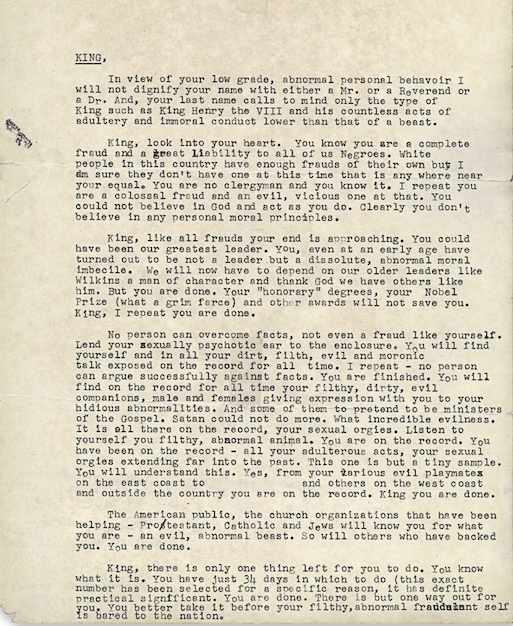In November of 1964, Martin Luther King received a chilling letter, purportedly from a disillusioned member of the African-American community. “King, look into your heart,” writes MLK’s critic. “You know you are a complete fraud and a great liability to all of us Negroes.”
The letter then turns menacing. It gives the civil rights leader a choice. Commit suicide or get killed:
You are done.
King, there is only one thing left for you to do. You know what it is. You have just 34 days in which to do it (this exact number has been selected for a specific reason, it has definite practical significance). You are done. There is but one way out for you. You better take it before your filthy, abnormal fraudulent self is bared to the nation.
Straight from the beginning, King knew the real author behind the “suicide letter,” as it’s now called. It was the FBI, led by J. Edgar Hoover, who harbored a deep and abiding hatred for King. For years, the public only had access to redacted copies of the letter. The redactions obscured the methods of the FBI — the way the agency tried to “fracture movements and pit leaders against one another,” writes the Electronic Frontier Foundation, and the way it used surveillance to invade King’s personal life and then blackmailed him with the information it gathered. That’s what’s happening in the paragraph that begins “No person can overcome the facts, not even a fraud like yourself.”
This summer, while researching at the National Archives, Beverly Gage, a professor of American history at Yale, stumbled upon an unredacted copy. You can read it above. On Tuesday, Gage wrote about the letter and its historical significance in The New York Times. The unredacted letter was also published in the Times.
via BoingBoing/EFF
Related Content:
200,000 Martin Luther King Papers Go Online
Free Online History Courses



Leave a Reply